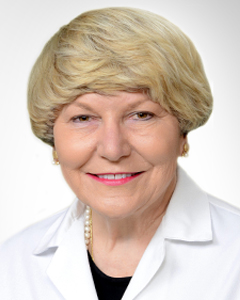Cancer Genetics High Risk Clinic
Much of the focus on cancer has been what to do after you’re diagnosed, but some patients may be especially high risk due to their genetics. Accounting for this population, the UF Health Cancer Center at Orlando Health opened a new comprehensive cancer center in September. The center provides genetic testing to help people with a family history of cancer understand their risk and potentially take preventative action that may save their lives.
The Story of Two Sisters
The center, which is the only one dedicated to cancer genetics in Central Florida, already has changed two lives. Beverly Cunningham was diagnosed with breast cancer three years ago. Beverly’s original diagnosis spurred her sister, Nancy Clutts, to undergo genetic testing. Beverly and Nancy’s mother had died in her 40s from cancer, so there was reason to be concerned.
Nancy learned that she was BRCA-1 positive, meaning she had a genetic mutation that increased her risk of getting cancer. People can inherit this gene from one or both parents, and they typically have many close relatives with a specific kind of cancer. Those who are BRCA-1 positive have an increased risk of getting breast and ovarian cancer compared to the general population.
After Nancy learned about her genetic risk, she decided to do something proactive with the information. She underwent a preventative prophylactic bilateral mastectomy, a surgery to remove one or both breasts. She and her sister, Beverly, are both cancer-free.
Genetic Testing
Genetic testing is typically done in people who have had cancer at a young age or who have a strong family history of a specific type of cancer or a cluster of different types of cancer suggesting a hereditary syndrome. Genetic counselors first give people in this group a cancer risk assessment questionnaire to complete and review the patient’s family and personal health history. Next the Genetic Counselor analyses the family and personal history and calculates the likelihood that a patient may harbor a genetic mutation. After thorough counseling, some patients may decide to undergo genetic testing, during which we take a blood or saliva sample to test for BRCA-1 gene mutations. We also now perform a genetics focused physical exam looking for physical signs suggesting a possible mutation (e.g., head circumference measurement, skin evaluation, oral exam).People who test positive have an increased risk of cancer, but genetic testing cannot determine with 100 percent certainty whether someone actually will get cancer.If you have a family history of cancer, you should consider genetic testing. Most insurance companies pay for only one genetic test in a lifetime. So if you’re going to do it, make sure it’s the most robust and comprehensive testing you can get.
At UF Health Cancer Center at Orlando Health, our goal every day is to save lives. This new center will help us fulfill that mission and arm people with information that could protect their health.
As Nancy Clutts said after learning about her genetic cancer risk, “the message is not to be afraid to take action.”







